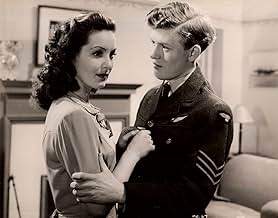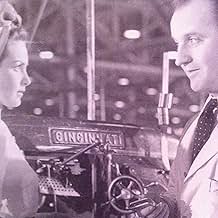Füge eine Handlung in deiner Sprache hinzuA young woman called into service at a factory during World War II falls in love with a member of the RAF.A young woman called into service at a factory during World War II falls in love with a member of the RAF.A young woman called into service at a factory during World War II falls in love with a member of the RAF.
- Regie
- Drehbuch
- Hauptbesetzung
- Mrs. Blythe
- (as Amy Vaness)
- Mrs. Hammond
- (Nicht genannt)
- Brenda - Worker at the Factory
- (Nicht genannt)
Empfohlene Bewertungen
Although it is clearly a propaganda film in essence, this wartime drama is quite interesting for not being as simplistic as some of its peers. In this family drama we don't really have a message pushed that hard but are instead left to draw out own warmth from a narrative that has a surprising amount about class within it. In this regard it does produce some interesting threads although those looking back for sharp comment will not find it because this is still a melodrama with a propaganda edge. As such it is a bit plodding at times but I still quite enjoyed it for what it was although I can understand why some viewers have found it a bit dull and lacking in sharpness.
The cast are pretty good with the material. Roc and Dunn give good if unspectacular turns as the daughters while Marriott provides a working class comic relief to proceedings as the father. Te support cast features good work from Jackson, Crawford and others but the performances are not as good as I would have liked just because the script doesn't cut as deep as it could have although perhaps understandably so.
Overall then a solid wartime melodrama with the heavy propaganda scaled back to allow for a more natural and convincing story delivered with solid turns. Aside from the touch of class politics there isn't that much to set the screen on fire but it should make good as a matinée on a weekend afternoon sort of thing.
This fast paced, light hearted and heartbreaking film about England during WWII starts great and gets better as it goes. The amazing thing, really, is that it was shot during the war and maintains a grim honesty as well as a necessary optimism. Hitler has to be defeated—but the movie makers, and all the actresses in their homespun honesty, did not know he would be.
There are some who label this purely a propaganda war film, and that the gritty lack of romanticizing is part of preparing the populace for the overwhelming nature of the problem. And somehow in an hour and a half you really sense how a country could be turned inside out. The cheerful holiday at the shore that starts the movie turns to families being broken up, women having to work in factories, and eventually news of family members never to return, killed in action.
The American documentary that comes to mind here is "Rosie the Riveter," about the enormous contributions of women in hard core industry (the poster to that shows a woman with a jackhammer). This is a fictional telling of the same idea, and it's far more enjoyable and in fact moving. (The poster for this film just shows a woman's face, with family members in the background—this is about the hearts and souls of the situation.)
I don't think of this as a true "propaganda" film for some simple reasons (all of which make me like the movie more). Foremost, it's not a government sponsored or requested movie—it's not technically in service to some greater force (as propaganda really has to be). It does of course support the home cause, the war against Hitler, and it does so in a way that the audience will pay to see. That's the bottom line here—this is a really compelling romance about real people in a real contemporary world that the audience knows very well. There are countless people to relate to, and details to recognize. The love story aspects are not developed very well, but they are overflowing with sincerity.
Wikipedia mentions that the movie was a "hit" in the USSR, which was also fighting Hitler. And the reason (to me) is simple: it's about regular people, the plight of the working class. There are few pretensions here (if any). And the filming is unusually tightly framed, by which I mean the compositions fill the frame, almost cramping the space on the screen, and it makes for a pleasure to watch, and makes for a lot to look at in every frame. And then the acting itself, without star power, is so straight forward and believable, even the slower moments make you pay attention.
A great film in a vein very very different than, say, "Casablanca" in 1942 (which some people also label as propaganda!). And it came out the same year, and in a way had the same larger context, though beyond that there is nothing in common at all. The point being that this is a terrific film on many levels once you let go of the more polished, and more immediately impressive American films of the same time.
Ditto 'Millions Like Us' by another talented duo. Launder and Gilliat, well established as scriptwriters, ventured into feature direction (the only time they took a joint credit) with this episodic and fascinating study of life on the home front.
It centres on the long, dull hiatus between the Blitz and invasion scares of 1940 and the forthcoming relief of D-Day in 1944. The propaganda purpose was to rededicate civilians who were becoming bored with the seeming stalemate: Hitler no longer menacing us, we not yet able to take the war to his camp. Women were targeted for morale-boosting. The film aimed to convince these 'millions' that their conscription into factories, often seen as unglamorous by comparison with uniformed service alongside the fighting men, was essential for victory.
Thus Patricia Roc, the shy home-keeping daughter of a domineering working class widower, dreams amusingly of heroics as a nurse or airwoman, and dreads being called up for industrial work on a production line in a strange town. But she makes friends, is good at her work, marries a nice flight-sergeant in the Royal Air Force and endures the vicissitudes that follow. Other girls from widely different social backgrounds muck in and do likewise.
So much for the uplift. Rarely has a pill been so deftly sugared, however. The scene-setting in the widower's house is an index of the film's almost obsessive determination to avoid overt uplift.
Rumours of war on the wireless are exchanged for dance music on the other channel. Patriotism does not visibly improve among the younger generation once hostilities begin. One daughter is man-mad, entertaining the troops not wisely but too well; another whose husband is serving in the Western Desert is a lazy, grumbling, neglectful mother. The old dad (Moore Marriott, gruff and unrecognisable as the antic dotard of the Will Hay classics) does his bit in the Home Guard but moans inconsolably about being 'deserted' by his daughters when the country whisks them away.
At the factory a socialite drafted to turn a lathe strikes up an uneasy friendship with her gruff northern supervisor; but he tells her she'll never be better than mediocre at the work, that she might not be good enough for his proletarian family and that he isn't ready to propose to her because they may be too different. "Ooh aye, ooh aye" she mockingly replies. This brilliantly crisp little exchange seems in retrospect to predict the bombshell Labour victory of 1945, when the people of the 'People's War' gave the upper crust its quittance and the rising technocratic class took control.
Laced with verite footage of crowds at play at the seaside or entering and leaving factories, the film plays like a fictionalised version of Humphrey Jennings's 'Spare Time' and 'Listen to Britain'-- with perhaps a conscious homage in the canteen community singing of the moving final episode. And through it runs the music of Beethoven, as if to acknowledge that the enemy has his good points: here it anticipates another Jennings classic, 'A Diary for Timothy'.
The acting, especially in the home sequences, is low-key in the same manner as Lean's 'This Happy Breed'. A far cry from the stagey histrionics of pre-war British cinema, it anticipates the naturalism of TV drama. There are no big speeches or characters, just commonplace folk muddling through. The interpolation of Naunton and Wayne, whom L&G had made a crosstalk team in 'The Lady Vanishes', is the only concession to a 1930s conception of entertainment.
Miss Roc, torn between father, duty and the dream of a domestic life, is a credible symbol of young British womanhood. Recent research, contrary to earlier feminist assertions, has established that most women were both glad to escape the parental home to aid the war effort, yet were not reluctant to become housewives once the fighting men returned. In this and other ways 'Millions Like Us' has a ring of truth absent from histrionic efforts such as Selznick's 'Since You Went Away' and retrospective looks at Riveting Rosies such as Demme's 'Swing Shift'.
That such a presentation could be achieved while the dilemmas were being experienced, and under the auspices of a government fighting total war, is a huge tribute to the integrity of the British film-making community. It remains a quietly, gradually engrossing pleasure to watch.
The theme is about the sacrifices made by the English during WWII, and the impact of the war on their lives. So many people ended up having their lives changes in ways that they didn't like, but the demand was to carry on. The story follows one family, and particularly the eldest daughter, who leaves home to work in a regional factory, meets and marries a young pilot.
Sounds trite? The film has a surprising balance of drama and war-time humour, and will be enjoyed by Beethoven fans. He should get a credit.
Wusstest du schon
- WissenswertesGrandpa Jim comments that his daughter Phyllis has progressed from dating "local lads" to "the United Nations." Interestingly, although the international organization with that name did not exist until two years after the film's release, the term "United Nations' was used to describe the allied forces arrayed against the Axis Powers. FDR used the term frequently.
- PatzerAlthough Fred Blake (Gordon Jackson) is flight crew on a Short Stirling (the type of aircraft Celia makes parts for and which is seen being towed out of the factory), there are at least two shots of Fred's aircraft taking off/climbing which are actually an Avro Lancaster.
- Zitate
Charlie: You can't cook or sew, I doubt if you can even knit. You know nothing about life, not what I call life. You're still only a moderate hand on a milling machine and if you had to fend for yourself in the midst of plenty you'd die of starvation. Those are only your bad points. I'm not saying you haven't got any good ones.
Jennifer: You're mighty generous Mr Forbes. As for you, you've no looks, you're old fashioned, morbidly suspicious, dull, and your pipe makes horrible bubbly noises.
- Crazy CreditsOpening credits --- over archive footage: NOTE: The orange is a spherical pulpish fruit of reddish-yellow color.
- VerbindungenFeatured in The Unforgettable Gordon Jackson (2012)
- SoundtracksSymphony No. 5 in C minor, Op. 67
(uncredited)
Music by Ludwig van Beethoven
Played over main titles and later in the score
Top-Auswahl
- How long is Millions Like Us?Powered by Alexa
Details
- Laufzeit1 Stunde 43 Minuten
- Farbe
- Seitenverhältnis
- 1.37 : 1
Zu dieser Seite beitragen



































